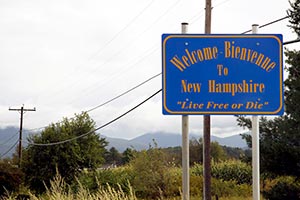New Hampshire Gets C-Minus for Infrastructure Funding

A civil engineering association gave New Hampshire a C-minus for its infrastructure, recommending spending hundreds of millions of dollars for upgrades.
"There's a huge lack of funding for infrastructure over the last 20 to 30 years, and it's catching up to us now," said Logan Johnson, chairman of the report card committee for the New Hampshire section of the American Society of Civil Engineers.
The 37-page report said it was designed to spark a conversation among residents and policymakers on areas to improve, from aviation to wastewater.
"While the overall grades are disappointing, they are not surprising," said state Transportation Commissioner Victoria Sheehan. "We are very pleased to see that the grades given to New Hampshire are in line with what we have been trying to explain to the Legislature and to the public over the last several years."
Fulfilling the report's recommendations "remains a funding issue," said DOT spokesman Bill Boynton. "Even as we focus on maintaining and preserving as well as improving the existing system, we have a significant backlog of needs created by many years of deferred maintenance."
More than $397 million is earmarked for transportation infrastructure this fiscal year, which runs through June 30. Funding includes $165 million from the federal government as well as additional funds from the state gas tax, vehicle registration and turnpike tolls.
The civil engineering association also conducted a national poll, which didn't grade all the same subject matters as the New Hampshire report. The nation earned a D-plus rating.
In January, Reuters said a poll it commissioned showed 51% of respondents didn't want a higher tax bill to pay to rebuild aging roads and bridges, while 56% said they didn't want the government to borrow money either. Some 50% said motorists should pay tolls and user fees, but 41% didn't want that type of funding.
New Hampshire scored best for aviation, energy and solid waste, with all C-pluses. Its worst grades, all D-pluses, came in stormwater, wastewater and ports.
Receiving C-minus grades were bridges, dams, drinking water, rail and roads. Hazardous waste received a C mark.
The eight criteria used to produce a grade for each category included funding, condition, future need and public safety.
The last report, in 2011, gave New Hampshire a C grade, but it is not a direct comparison because some sections were added or dropped. The schools category, for instance, was dropped in this report because of a lack of recent data on the condition of school infrastructure.
The report said infrastructure investments at the state's 25 public airports will exceed available funding by $100 million to $200 million over the next 20 years.
Nearly four of five state-owned bridges were built before 1980. And as of late 2015, 12.8% of the bridges were deemed structurally deficient.
Wastewater scored a D-plus for a lack of sustainable funding.
"New Hampshire must address the artificially low sewer rates most utilities charge," the report said. "Sewer rates should be based on the sustainability of the utilities' assets, the ability to meet new regulatory requirements and maintenance of adequate reserves to pay for emergency work."
Johnson, a civil engineer with Geosyntec in Bedford, said a committee of nearly two dozen experts and volunteers worked on New Hampshire's report card.
Distributed by Tribune Content Agency, LLC

